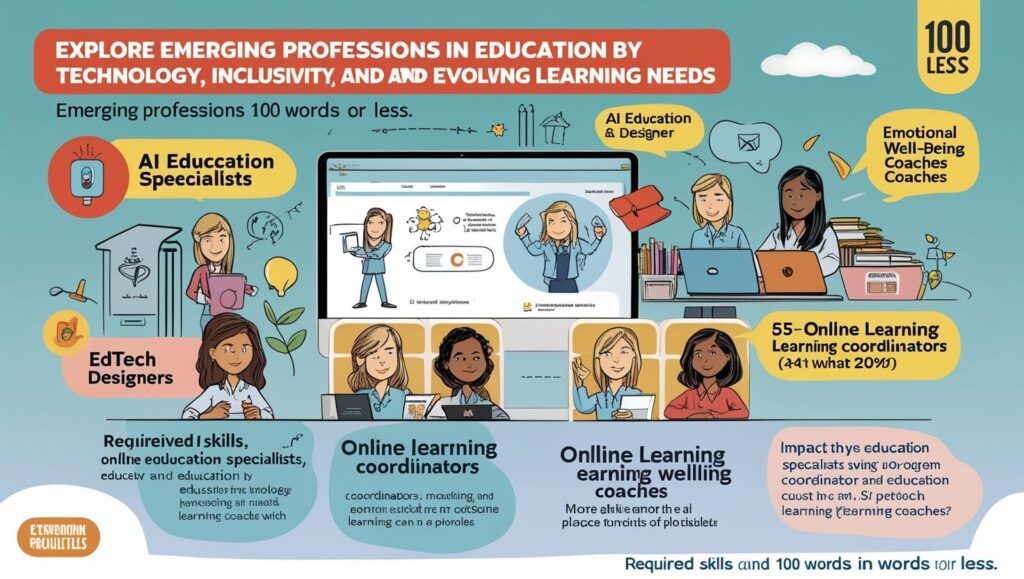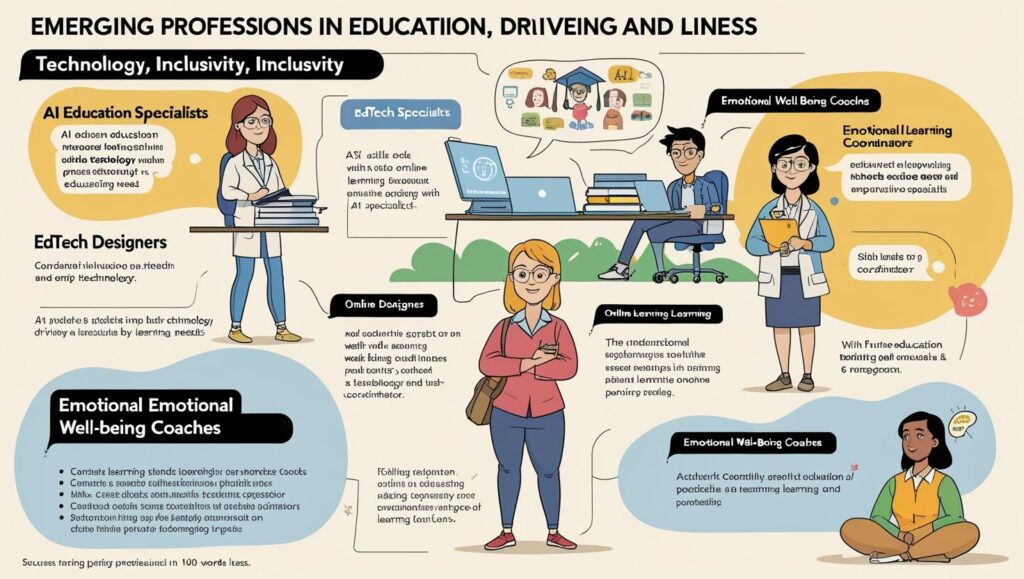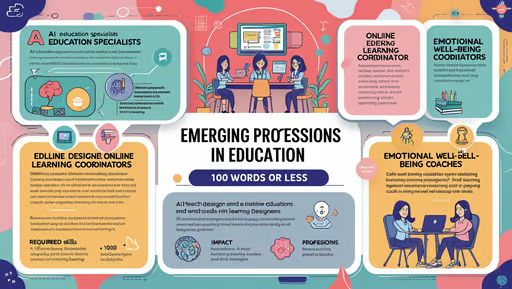Introduction
Emerging Professions in Education, The education sector is evolving rapidly due to technological advancements, globalization, and changing workforce demands. Traditional teaching roles are being redefined, and new professions are emerging to meet the needs of 21st-century learners. From AI-driven mentors to virtual reality instructors, the future of education will be shaped by innovative roles that blend pedagogy with cutting-edge technology. This article explores the most promising emerging professions in education, highlighting how they will transform learning experiences in the coming years.
1. AI-Powered Learning Coaches
Artificial Intelligence (AI) is revolutionizing education by enabling personalized learning experiences. AI-powered learning coaches analyze student performance, identify knowledge gaps, and recommend customized study plans. These digital mentors provide instant feedback, adapt lessons in real-time, and offer 24/7 academic support. Unlike traditional tutors, AI coaches use machine learning to refine their teaching strategies based on student interactions, ensuring optimal learning outcomes.
Educational institutions are increasingly integrating AI-driven platforms like chatbots and adaptive learning software. In the future, AI coaches may even assist in career counseling, helping students choose career paths based on their skills and interests. As AI continues to advance, this profession will become indispensable in both formal and informal education settings.
2. Virtual Reality (VR) Education Designers
Virtual Reality (VR) is transforming classrooms into immersive learning environments. VR education designers create interactive simulations that allow students to explore historical events, conduct virtual science experiments, or practice real-world skills in a risk-free setting. These professionals combine expertise in instructional design, 3D modeling, and cognitive psychology to develop engaging VR curricula.
Medical schools, engineering programs, and vocational training centers are already adopting VR-based learning. In the future, VR designers will collaborate with neuroscientists to optimize brain-compatible learning experiences. As VR technology becomes more accessible, this profession will expand into K-12 education, corporate training, and lifelong learning programs.

3. Neuroeducation Specialists
The Neuroeducation merges neuroscience with teaching methodologies to enhance learning efficiency. Neuroeducation specialists study how the brain processes information and apply these insights to improve instructional techniques. They may use brainwave-monitoring devices, such as EEG headsets, to assess student engagement and tailor lessons accordingly.
This emerging field is particularly valuable for students with learning disabilities, as neuroeducation can help identify cognitive barriers and develop targeted interventions. Schools and universities may soon employ neuroeducation experts to optimize curriculum design, classroom environments, and assessment methods for better academic performance.
4. Gamification Experts
The Gamification—applying game-design elements in education—boosts student motivation and engagement. Gamification experts design educational programs that incorporate rewards, leaderboards, and interactive challenges to make learning more enjoyable. They work with educators to integrate game mechanics into subjects like math, language, and science, ensuring students remain actively involved.
With the rise of e-learning platforms, gamification specialists are in high demand. They analyze user behavior, refine engagement strategies, and develop digital badges or achievement systems. As gamification becomes a standard teaching tool, this profession will play a crucial role in both academic and corporate training environments.
5. Data-Driven Education Analysts
Big data is reshaping education by providing insights into student performance, attendance patterns, and learning trends. Data-driven education analysts collect and interpret vast amounts of academic data to improve teaching strategies and institutional policies. They use predictive analytics to identify at-risk students and recommend early interventions.
Universities and EdTech companies increasingly rely on data analysts to optimize online courses, personalize learning experiences, and measure educational outcomes. As schools adopt more digital tools, the demand for professionals skilled in educational data mining and learning analytics will surge.
6. Online Learning Facilitators
The shift toward digital education has created a need for online learning facilitators who guide students through virtual classrooms. Unlike traditional teachers, these professionals specialize in managing remote learning environments, fostering online discussions, and ensuring student engagement through digital platforms.
With hybrid and fully online degree programs on the rise, online facilitators must be proficient in video conferencing tools, learning management systems (LMS), and asynchronous teaching methods. This role is expected to grow as more institutions embrace flexible learning models.
7. Sustainability Education Consultants
As climate change and environmental concerns gain global attention, sustainability education consultants are emerging as key players in curriculum development. They design programs that teach students about renewable energy, conservation, and eco-friendly practices. Schools and corporations hire these experts to integrate sustainability into science, business, and engineering courses.
Future sustainability educators may also work with policymakers to promote green initiatives in education. As environmental literacy becomes a priority, this profession will expand across schools, universities, and corporate training programs.

8. Emotional Intelligence (EI) Coaches
Social-emotional learning (SEL) is gaining recognition as a critical component of education. Emotional Intelligence (EI) coaches help students develop self-awareness, empathy, and interpersonal skills. They conduct workshops, one-on-one sessions, and group activities to enhance emotional well-being and conflict-resolution abilities.
Schools are increasingly incorporating SEL into their curricula to address mental health and behavioral issues. In the future, EI coaches may collaborate with AI systems to monitor student emotions and provide real-time support, making this profession essential for holistic education.
9. EdTech Integration Specialists
With the rapid adoption of educational technology, schools need experts who can seamlessly integrate digital tools into classrooms. EdTech integration specialists train teachers on using AI, VR, and LMS platforms effectively. They also evaluate new technologies and recommend the best solutions for different learning environments.
As schools continue to invest in smart classrooms and digital resources, the demand for these specialists will rise. Their role ensures that technology enhances—rather than disrupts—the learning process.
10. Micro-Credentialing and Badging Experts
Traditional degrees are being supplemented with micro-credentials—short, skill-specific certifications. Micro-credentialing experts design and assess these programs, ensuring they meet industry standards. They collaborate with employers and universities to create stackable credentials that enhance employability.
This profession is growing as lifelong learning becomes the norm. Professionals in this field help learners upskill efficiently, making education more flexible and career-oriented.
Conclusion
The future of education lies in innovation, personalization, and technology integration. Emerging professions like AI learning coaches, VR education designers, and neuroeducation specialists are redefining how we teach and learn. As the sector evolves, these roles will become increasingly vital in creating adaptive, engaging, and effective learning experiences. Educators, policymakers, and students must embrace these changes to stay ahead in the dynamic world of education.

5 thoughts on “Emerging Professions in Education”
Comments are closed.